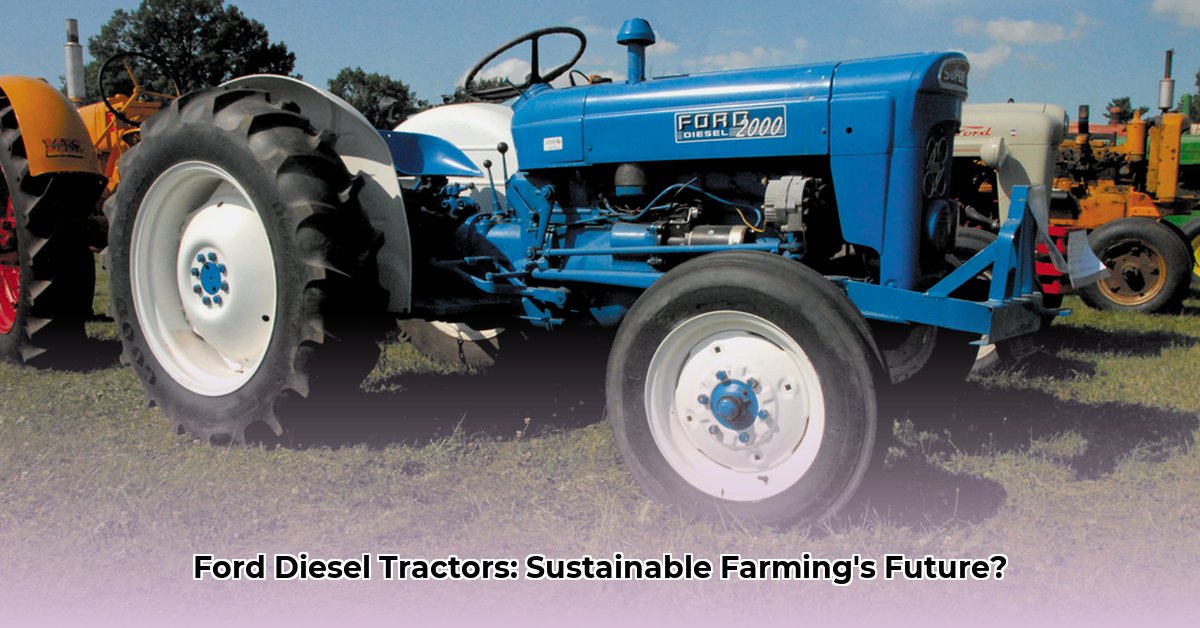
Diesel Ford tractors, iconic workhorses of the agricultural landscape, have long been synonymous with reliability and durability. But in an era increasingly focused on sustainable agriculture, their role requires careful examination. This article explores the complex relationship between these venerable machines and the pursuit of environmentally responsible farming practices. We will analyze fuel efficiency, longevity, environmental impact, and suitability for various sustainable farming techniques. Finally, we'll consider the challenges and future prospects of diesel Ford tractors in a rapidly evolving agricultural technology landscape. For more details on specific models, check out the Ford 5000 specs.
Fuel Efficiency: A Legacy of Endurance
Fuel efficiency is paramount in modern agriculture. While newer tractors boast impressive fuel economy figures, older diesel Ford tractors often surprise with their longevity and surprisingly efficient fuel use over their lifetime. Models like some in the 8000 series, known for their robust design, earned a reputation for exceptional fuel efficiency for their time. However, direct comparisons to modern, more technologically advanced tractors must account for varying factors such as soil type, field size, and operator skill. The consistent efficiency of a well-maintained older model, however, frequently surpasses that of a neglected newer machine. A well-maintained Ford tractor, regardless of age, offers a compelling case for sustainable operation. This longevity minimizes fuel consumption per unit of work over the tractor's lifespan.
Longevity and Repair: The Simplicity of Sustainability
A significant advantage of older diesel Ford tractors lies in their mechanical simplicity. This translates to easier maintenance and repair, a considerable benefit financially and in terms of environmental impact. Many mechanics possess extensive experience working on these machines, reducing reliance on specialized technicians and often leading to faster, cheaper repairs. Furthermore, readily available parts contribute to the extended operational lifespan of these tractors. This ease of maintenance reduces waste, a core principle of sustainable practices. The ability to extend the operational life of a tractor for 15-20 years through diligent maintenance far surpasses the environmental impact of more frequent replacements, even with newer, potentially more fuel-efficient machines.
Environmental Impact: A Lifecycle Perspective
Diesel engines, by their nature, produce emissions. Compared to modern tractors equipped with advanced emission control systems, older diesel Ford tractors release greater quantities of greenhouse gases. However, a complete assessment requires a lifecycle analysis (LCA), considering the entire operational lifespan of the machine. A diesel Ford tractor operating for decades possesses a smaller overall carbon footprint than repeatedly purchasing and discarding newer models, even if those replacements are initially more fuel-efficient. Strategies like regular maintenance, optimized engine tuning, and the utilization of biodiesel blends can further mitigate the environmental impact of these tractors. Small emission reductions, multiplied across a long operational lifespan, contribute significantly to overall sustainability efforts.
Sustainable Farming Practices: Adaptability and Integration
Diesel Ford tractors demonstrate surprising compatibility with various modern sustainable farming methods. While they may not seamlessly integrate with sophisticated precision agriculture technologies, their robust build and power make them well-suited to no-till farming techniques. The ability to navigate challenging terrain and consistently deliver power is essential for success in no-till farming, where soil disturbance is minimized. Similarly, integrated pest management (IPM) practices, which emphasize minimizing pesticide use, benefit from the dependable performance of a robust tractor for the timely application of treatments. In these contexts, a well-maintained diesel Ford tractor continues to act as a cornerstone of environmentally conscious practices.
Challenges and Limitations: Acknowledging the Realities
Despite their advantages, certain limitations must be acknowledged. Older diesel Ford tractors consume more fuel than modern alternatives, increasing operational costs. While maintenance is often simpler, it can still be labor-intensive. The availability of parts for very old models might decline over time. Furthermore, stricter emission regulations pose potential challenges to the future operational life of these tractors in certain regions. Farmers should carefully weigh these factors when assessing the long-term practicality and economic viability of diesel Ford tractors.
The Future: Adaptation and Technological Advancements
The agricultural technology landscape is rapidly changing, with electric and alternative-fuel tractors gaining prominence. However, this doesn't necessarily signal the obsolescence of diesel Ford tractors. Significant potential exists in employing biodiesel and other alternative fuels to lessen their environmental impact. Retrofit kits designed to reduce emissions are also under development. The future may not involve complete replacement, but rather the adaptation and optimization of existing machinery to enhance sustainability.
Summary of Key Findings
- Diesel Ford tractors, due to their longevity, can offer surprisingly sustainable advantages, particularly regarding cost-effectiveness.
- Regular maintenance significantly impacts both fuel efficiency and emissions reduction.
- Their suitability for no-till farming and IPM methods highlights their role in sustainable practices.
- Exploring Biofuels and emission reduction technologies holds promise for mitigating environmental concerns.
- Strategic planning, including parts sourcing and considering future emission regulations, is critical for long-term viability.
The role of diesel Ford tractors in sustainable agriculture is complex. Their higher emissions are a concern, but their longevity and simplicity offer major advantages. Ongoing research and technological advancements in alternative fuels and emissions reduction hold the key to further enhancing their sustainability profile. The issue requires a balanced assessment of long-term environmental impact, economic feasibility, and the practical considerations of maintaining older machinery. Ultimately, these tractors' continued contribution to sustainable farming hinges on adaptation and innovation within a changing technological landscape.